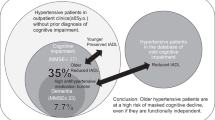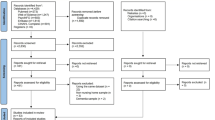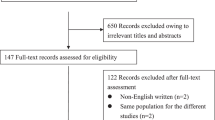Abstract
Mild cognitive impairment (MCI) is common in patients with hypertension. Prevalence estimates of MCI in hypertensive patients are needed to guide both public health and clinical decision making. A literature search was conducted in four databases, including PubMed, Embase, Cochrane Library, and Web of Science, from their inception to February 2021. The methodological quality assessment used the risk of bias tool. The pooled prevalence of MCI in hypertensive patients was determined by a random-effects model. Heterogeneity was explored using sensitivity analysis, subgroup analysis, and random effects meta-regression. Of 2314 references, 11 studies (47,179 participants) were included in the meta-analysis. The overall pooled prevalence of MCI in patients with hypertension was 30% (95% CI, 25–35), with significant heterogeneity present (I2 = 99.3%, p < 0.001). In subgroup analyses, Asian and European samples had a prevalence of 26% (95% CI, 20–31) and 40% (95% CI, 14–66), respectively; cross-sectional and cohort studies had a prevalence of 28% (95% CI, 24–32) and 38% (95% CI, −5–81); age older than 60 years had a prevalence of 28% (95% CI, 23–33); community-based and clinic-based samples had a prevalence of 17% (95% CI, 15–19) and 42% (95% CI, 23–62); and MCI diagnosis using the MoCA, NIA-AA, MMSE, and Peterson criteria had a prevalence of 64% (95% CI, 59–68), 18% (95% CI, 16–19), 19% (95% CI, 15–23), and 13% (95% CI, 9–17). Meta-regression analysis showed that different MCI diagnostic criteria could be the source of heterogeneity in the pooled results. MCI is common in patients with hypertension, with an overall prevalence of 30%. Earlier cognitive screening and management in hypertensive patients should be advocated.
This is a preview of subscription content, access via your institution
Access options
Subscribe to this journal
Receive 12 print issues and online access
$259.00 per year
only $21.58 per issue
Buy this article
- Purchase on SpringerLink
- Instant access to full article PDF
Prices may be subject to local taxes which are calculated during checkout


Similar content being viewed by others
Change history
26 July 2021
This article has been updated.
References
Forouzanfar M, Liu P, Roth G, Ng M, Biryukov S, Marczak L, et al. Global burden of hypertension and systolic blood pressure of at least 110 to 115 mmHg, 1990-2015. JAMA 2017;317:165–82.
Mills KT, Bundy JD, Kelly TN, Reed JE, Kearney PM, Reynolds K, et al. Global disparities of hypertension prevalence and control: a systematic analysis of population-based studies from 90 countries. Circulation 2016;134:441–50.
Lu J, Lu Y, Wang X, Li X, Linderman GC, Wu C, et al. Prevalence, awareness, treatment, and control of hypertension in China: data from 1·7 million adults in a population-based screening study (China PEACE Million Persons Project). Lancet 2017;390:2549–58.
Carey RM, Muntner P, Bosworth HB, Whelton PK. Prevention and control of hypertension: JACC health promotion series. J Am Coll Cardiol 2018;72:1278–93.
Iadecola C, Gottesman RF. Neurovascular and cognitive dysfunction in hypertension. Circ Res 2019;124:1025–44.
Shah NS, Vidal JS, Masaki K, Petrovitch H, Ross GW, Tilley C, et al. Midlife blood pressure, plasma beta-amyloid, and the risk for Alzheimer disease: the Honolulu Asia Aging Study. Hypertension 2012;59:780–6.
Ronnemaa E, Zethelius B, Lannfelt L, Kilander L. Vascular risk factors and dementia: 40-year follow-up of a population-based cohort. Dement Geriatr Cogn Disord 2011;31:460–6.
Piscopo P, Lacorte E, Feligioni M, Mayer F, Crestini A, Piccolo L, et al. MicroRNAs and mild cognitive impairment: a systematic review. Ageing Res Rev 2019;50:131–41.
Busse A, Angermeyer MC, Riedel-Heller SG. Progression of mild cognitive impairment to dementia: a challenge to current thinking. Br J Psychiatry 2006;189:399–404.
Lu Y, Liu C, Yu D, Fawkes S, Ma J, Zhang M, et al. Prevalence of mild cognitive impairment in community-dwelling Chinese populations aged over 55 years: a meta-analysis and systematic review. BMC Geriatr 2021;21:10.
Vicario A, Cerezo GH, del Sueldo M, Zilberman J, Pawluk SM, Lódolo N, et al. Neurocognitive disorder in hypertensive patients. Heart–Brain Study. Hipertension y Riesgo Vascular 2018;35:169–76.
Lazo-Porras M, Ortiz-Soriano V, Moscoso-Porras M, Runzer-Colmenares FM, Málaga G, Jaime, et al. Cognitive impairment and hypertension in older adults living in extreme poverty: a cross-sectional study in Peru. BMC Geriatr 2017;17:250.
Vicario A, Cerezo GH, Del Sueldo M, Zilberman J, Pawluk SM, Lódolo N, et al. Neurocognitive disorder in hypertensive patients. Heart-Brain Study Hipertens Riesgo Vasc 2018;35:169–76.
Yano Y, Bakris GL, Inokuchi T, Ohba Y, Tamaki N, Nagata M, et al. Association of cognitive dysfunction with cardiovascular disease events in elderly hypertensive patients. J Hypertens 2014;32:423–31.
Vicario A, del Sueldo MA, Zilberman JM, Cerezo GH. Cognitive evolution in hypertensive patients: a six-year follow-up. Vasc Health Risk Manag 2011;7:281–5.
Hoy D, Brooks P, Woolf A, Blyth F, March L, Bain C, et al. Assessing risk of bias in prevalence studies: modification of an existing tool and evidence of interrater agreement. J Clin Epidemiol 2012;65:934–9.
Jia LF, Du YF, Chu L, Zhang ZJ, Li FY, Lyu DY, et al. Prevalence, risk factors, and management of dementia and mild cognitive impairment in adults aged 60 years or older in China: a cross-sectional study. Lancet. Public Health 2020;5:E661–E71.
Heizhati M, Wang L, Li N, Li M, Pan F, Yang Z, et al. Prevalence of mild cognitive impairment is higher in hypertensive population: a cross-sectional study in less developed northwest China. Medicine. 2020;99:e19891.
Fu J. Z., Liu Q., Du Y., Zhu Y., Sun C. Q., Lin H. Y., et al. Age- and sex-specific prevalence and modifiable risk factors of mild cognitive impairment among older adults in China: a population-based observational study. Front Aging Neurosci. 2020;12.
Wu L, He Y, Jiang B, Liu M, Wang JH, Yang SS, et al. The association between the prevalence, treatment and control of hypertension and the risk of mild cognitive impairment in an elderly urban population in China. Hyperten Res 2016;39:367–75.
Bai J, Wei P, Zhao N, Xiao Y, Yang C, Zhong J, et al. A study of mild cognitive impairment in veterans: role of hypertension and other confounding factors. Neuropsychol Dev Cogn B Aging Neuropsychol Cogn. 2016;23:703–15.
Mehra A., Suri V., Kumari S., Avasthi A., Grover S. Association of mild cognitive impairment and metabolic syndrome in patients with hypertension. Asian J Psychiatry. 2020;53.
Jimenez-Balado J, Riba-Llena I, Abril O, Garde E, Penalba A, Ostos E, et al. Cognitive impact of cerebral small vessel disease changes in patients with hypertension. Hypertension 2019;73:342–9.
Sizova Z. M., Karaulov A. V., Lapidus N. I., Shikh E. V., Shindryaeva N. N., Zakharova V. L., et al. Clinical and instrumental peculiarities of the course of arterial hypertension in patients with cognitive function impairments. Electron J Gen Med. 2018;15.
Yaneva-Sirakova T, Traykov L, Petrova J, Gruev I, Vassilev D. Screening for mild cognitive impairment in patients with cardiovascular risk factors. Neuropsychiatr Dis Treat 2017;13:2925–34.
Chudiak A, Uchmanowicz I, Mazur G. Relation between cognitive impairment and treatment adherence in elderly hypertensive patients. Clin Inter Aging 2018;13:1409–18.
Koyanagi A, Lara E, Stubbs B, Carvalho AF, Oh H, Stickley A, et al. Chronic physical conditions, multimorbidity, and mild cognitive impairment in low- and middle-income countries. J Am Geriatr Soc 2018;66:721–7.
Pais R., Ruano L., O. P. C., Barros H. Global cognitive impairment prevalence and incidence in community dwelling older adults—a systematic review. Geriatrics. 2020;5.
Xue J, Li J, Liang J, Chen S. The prevalence of mild cognitive impairment in China: a systematic review. Aging Dis 2018;9:706–15.
Baiano C, Barone P, Trojano L, Santangelo G. Prevalence and clinical aspects of mild cognitive impairment in Parkinson’s disease: a meta-analysis. Mov Disord. 2020;35:45–54.
Yaneva-Sirakova T, Tarnovska-Kadreva R, Traykov L, Vassilev D, Gruev I, Yaneva M. The incidence of mild cognitive impairment in diabetic patients with arterial hypertension. Alzheimer’s Dement. 2016;12:P909.
Ismail Z, Elbayoumi H, Fischer CE, Hogan DB, Millikin CP, Schweizer T, et al. Prevalence of depression in patients with mild cognitive impairment: a systematic review and meta-analysis. JAMA Psychiatry. 2017;74:58–67.
Kapusta J, Kidawa TM, Rynkowska-Kidawa M, Irzmanski TR, Kowalski TJ. Evaluation of frequency of occurrence of cognitive impairment in the course of arterial hypertension in an elderly population. Psychogeriatrics. 2020;20:406–11.
Mariani E, Monastero R, Mecocci P. Mild cognitive impairment: a systematic review. J Alzheimer’s Dis. 2007;12:23–35.
Cho MH, Shin DW, Chang SA, Lee JE, Jeong SM, Kim SH, et al. Association between cognitive impairment and poor antihypertensive medication adherence in elderly hypertensive patients without dementia. Sci Rep. 2018;8:11688.
Firbank M, Wiseman R, Burton E, Saxby B, O’Brien J, Ford G. Brain atrophy and white matter hyperintensity change in older adults and relationship to blood pressure. Brain atrophy, WMH change and blood pressure. J Neurol. 2007;254:713–21.
Glodzik L, Mosconi L, Tsui W, de Santi S, Zinkowski R, Pirraglia E, et al. Alzheimer’s disease markers, hypertension, and gray matter damage in normal elderly. Neurobiol aging 2012;33:1215–27.
Gottesman R, Schneider A, Albert M, Alonso A, Bandeen-Roche K, Coker L, et al. Midlife hypertension and 20-year cognitive change: the atherosclerosis risk in communities neurocognitive study. JAMA Neurol. 2014;71:1218–27.
Suvila K, Lima J, Yano Y, Tan Z, Cheng S, Niiranen T. Early-but not late-onset hypertension is related to midlife cognitive function. Hypertension 2021;77:972–9.
Ashby E, Miners J, Kehoe P, Love S. Effects of hypertension and anti-hypertensive treatment on amyloid-β (Aβ) plaque load and Aβ-synthesizing and Aβ-degrading enzymes in frontal cortex. J Alzheimer’s Dis. 2016;50:1191–203.
Martinez-Lemus L, Hill M, Meininger G. The plastic nature of the vascular wall: a continuum of remodeling events contributing to control of arteriolar diameter and structure. Physiology. 2009;24:45–57.
Scuteri A, Nilsson P, Tzourio C, Redon J, Laurent S. Microvascular brain damage with aging and hypertension: pathophysiological consideration and clinical implications. J Hypertens. 2011;29:1469–77.
Capone C, Faraco G, Peterson J, Coleman C, Anrather J, Milner T, et al. Central cardiovascular circuits contribute to the neurovascular dysfunction in angiotensin II hypertension. J Neurosci. 2012;32:4878–86.
Pires P, Jackson W, Dorrance A. Regulation of myogenic tone and structure of parenchymal arterioles by hypertension and the mineralocorticoid receptor. Am J Physiol Heart Circ Physiol. 2015;309:H127–36.
Chang-Quan H, Hui W, Chao-Min W, Zheng-Rong W, Jun-Wen G, Yong-Hong L, et al. The association of antihypertensive medication use with risk of cognitive decline and dementia: a meta-analysis of longitudinal studies. Int J Clin Pract. 2011;65:1295–305.
Rouch L, Cestac P, Hanon O, Cool C, Helmer C, Bouhanick B, et al. Antihypertensive drugs, prevention of cognitive decline and dementia: a systematic review of observational studies, randomized controlled trials and meta-analyses, with discussion of potential mechanisms. CNS Drugs. 2015;29:113–30.
Haring B., Wu C., Coker L. H., Seth A., Snetselaar L., Manson J. E., et al. Hypertension, antihypertensive treatment, sodium intake and cognitive decline. Circulation. 2015;131.
Cho M, Shin D, Chang S, Lee J, Jeong S, Kim S, et al. Association between cognitive impairment and poor antihypertensive medication adherence in elderly hypertensive patients without dementia. Sci Rep. 2018;8:11688.
Author information
Authors and Affiliations
Contributions
QJ and ZL designed the research, QJ and LQ conducted the research, HZ and WL collected data, and WW and LY assessed the risk of bias. QJ and ZL participated in data analysis and interpretation and wrote the paper. All authors contributed to the article and approved the submitted version.
Corresponding authors
Ethics declarations
Conflict of interest
The authors declare that the research was conducted in the absence of any commercial or financial relationships that could be construed as a potential conflict of interest.
Additional information
Publisher’s note Springer Nature remains neutral with regard to jurisdictional claims in published maps and institutional affiliations.
Rights and permissions
About this article
Cite this article
Qin, J., He, Z., Wu, L. et al. Prevalence of mild cognitive impairment in patients with hypertension: a systematic review and meta-analysis. Hypertens Res 44, 1251–1260 (2021). https://doi.org/10.1038/s41440-021-00704-3
Received:
Accepted:
Published:
Issue Date:
DOI: https://doi.org/10.1038/s41440-021-00704-3
Keywords
This article is cited by
-
Subclinical left ventricular dysfunction assessed by global longitudinal strain correlates with mild cognitive impairment in hypertensive patients
Hypertension Research (2025)
-
The association between the estimated glomerular filtration rate and cognitive impairment: the Suita Study
Hypertension Research (2024)
-
Association between intensity of physical activity and cognitive function in hypertensive patients: a case–control study
Scientific Reports (2024)
-
Insights from Turkey's big data: unraveling the preventability, pathogenesis, and risk management of Alzheimer's disease (AD)
Scientific Reports (2024)
-
A non-linear relationship between blood pressure and mild cognitive impairment in elderly individuals: A cohort study based on the Chinese longitudinal healthy longevity survey (CLHLS)
Neurological Sciences (2024)



